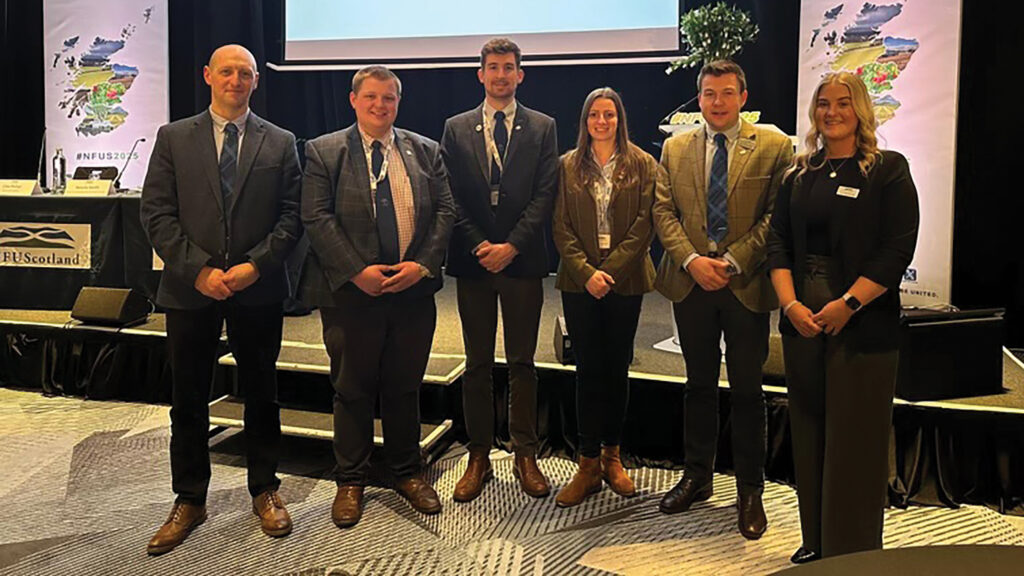New NFU Scotland top team faces key farming challenges
 © Adobe Stock
© Adobe Stock Scotland’s agricultural sector is undergoing a pivotal shift, moving away from the EU’s common agricultural policy framework to a more tailored system of support.
This transformation aims to balance environmental sustainability, food security, and the socio-economic vitality of rural communities, while navigating the complexities that come with such change.
NFU Scotland (NFUS) says robust government backing is essential to ensure the success of the farming and crofting industry throughout this transition.
See also: NFU Scotland commits to diversity report recommendations
The union has consistently advocated a smooth shift, with repeated assurances from cabinet secretary Mairi Gougeon and the Scottish government that farmers and crofters will not face a “cliff edge” scenario.
At NFUS’ annual conference in Glasgow last week, a new leadership team was formed, tasked with guiding the sector through these critical changes.

© NFU Scotland
After serving the maximum four-year term as president, along with eight years as an officeholder, Highland Perthshire farmer Martin Kennedy received an emotional farewell.
Aberdeenshire farmer Andrew Connon was elected as the new president after securing a win in a two-way race against Alasdair Macnab. Additionally, Kintyre farmer Duncan Macalister and Robert Neill, a tenant farmer from the Scottish Borders, were appointed as vice-presidents.
NFUS chief executive John Davidson revealed data at the conference which shows that union leaders spend more hours meeting Scottish government officials and MSPs than any other lobbying organisation.
The new leadership team is determined to build strong relationships with both the UK and Scottish governments, while clearly defining their priorities for these partnerships.
While the relationship between NFUS and the Scottish government is characterised by collaboration and negotiation, the union’s director of policy, Jonnie Hall, says frustrations can arise with broader challenges posed by UK government policies.
For instance, Mr Hall says resolving the inheritance tax dispute is the top concern for farmer members on the Westminster front.
“We have had meetings with backbench Labour MPs, Scotland office ministers, and Defra minister Daniel Zeichner, but at the end of the day, that doesn’t count – we need to get to the Treasury,” he notes.
No ring-fenced budget
In addition to higher employer national insurance contributions and tax hikes on double-cab pickups, Mr Hall says the most significant shift for Scottish agriculture following the October Budget is the consolidation of agricultural funding into the block grant.
This change means that decisions on agricultural support will now be more directly influenced by the Scottish government’s broader budgetary priorities.
During the Scottish parliament budget review, NFUS called for an increase in the farming and crofting budget to £776m.
The Scottish government has allocated about £680m for the 2025-26 financial year, which NFUS acknowledges provides farmers with “some security”. However, the union says this amounts to a “rollover” and represents a real-terms decline when factoring in inflation.
Farm leaders would like to see the continuation of a ring-fenced, multi-year fund – which pertained under the CAP – to give financial security to farmers.
But it is understood that a funding allocation for the next three years is the best they can hope for from the upcoming spring spending review.
The UK formally left the EU in January 2020. For Scottish farmers, not much has changed in terms of how the budget is allocated, especially compared to farmers in England, Wales and Northern Ireland, where the transition is further ahead.
Crucially, Scottish farmers and crofters have some level of “security” as funding for the Basic Payment Scheme, “greening”, the Less Favoured Area Support Scheme, and coupled support for both the suckler beef and sheep sectors continues.
Capital grant scheme
NFUS has also welcomed further details on the budget announced by first minister John Swinney at its annual conference.
Mr Swinney confirmed that £46m, which was previously taken from the agricultural budget to combat the cost of living crisis, will be returned. Scottish farmers and crofters will benefit from a new capital grant scheme, with £20m available this financial year and £26m next year.
The scheme will focus on new entrants, young farmers and environment resilience. Funding will also be available for food processing, co-operation and marketing beyond the farm gate.
In his address, Mr Swinney updated delegates on how the route map to implementing the new four-tiered framework of agriculture support will work, although this is not expected to be fully implemented until 2027 at the earliest.
He confirmed that at least 70% of direct support will be delivered through the new Tier 1, acknowledging that more conditionality will be attached to payments, starting with a Whole Farm Plan.
NFUS says this is a “significant win” for the union’s lobbying, and it aligns with its calls for a high level of direct support.
Another key announcement in Mr Swinney’s conference speech was the allocation of £7m in 2025 through the Agri-Environment Climate Scheme to support initiatives that promote nature, climate, and biodiversity, alongside sustainable food production.
Mr Swinney also committed to implementing ultra-high frequency electronic identification for cows to improve traceability.
A three-year initiative using lidar laser scanning technology will be launched to accurately map terrain, providing crucial data for effective land management and agricultural planning.
Mr Swinney announced a new summit to explore solutions for attracting the next generation of farmers, while also confirming continued support for the Fruit and Vegetables Aid Scheme.
He also promised that the Scottish National Party-ruled Scottish government would never support the reintroduction of lynx into the countryside and noted the “unintended consequences” on the sector of bringing back sea eagles.
A major concern raised by farmers at the conference was the ongoing difficulties in attracting workers. One key NFUS proposal is extending the seasonal worker visa from six to nine months.
IT system ‘constraints’
It is believed the implementation of new IT systems necessary for delivering the framework has faced challenges, particularly due to limited funding for infrastructure and regulatory updates.
“The constraints faced by Scottish government, in terms of funding for IT, is what is dictating the pace of change,” says Mr Hall.
As a result, Scotland’s agricultural transition is progressing more slowly than in other regions. However, NFUS emphasises the importance of getting it right, ensuring a balance between environmental objectives and the economic sustainability of farming businesses.
“We need a smooth transition, with a soft landing,” Mr Hall explains.
Top team priorities
In an interview with Farmers Weekly, NFUS vice-president Robert Neill insists “the work starts now”.
Mr Neill says his top priority is pushing for more domestic food to be produced to increase national food security.
Securing a farming future for the next generation and increasing NFUS membership numbers – currently about 9,000 active farmer-members – are among his other top goals.
“We’re a lobbying organisation, so the more members and money we have, the more lobbying we can do on behalf of farmers and crofters across Scotland and the UK,” he says.
Asked about his priorities as the new president, Andrew Connon stresses that challenging the UK government’s farm inheritance plans is “critical”. “We’re united with all four main farming unions on this issue, and we won’t back down.”
He warns that the policy, as it stands, would have “devastating consequences for family farms across the UK”.
Mr Connon also says he is focused on securing future funding that is “fit for purpose”, calling for a balance between species management and farming, promoting new initiatives for the next generation of farmers, and improving communication with both members and the wider public.
With these priorities, Mr Connon is determined to steer Scottish agriculture towards a sustainable and resilient future.
